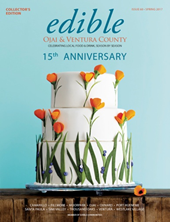 VENTURA COUNTY — Regional magazine Edible Ojai & Ventura County, part of Edible Communities–the James Beard Foundation award-winning family of 100 locally owned and licensed food magazines—is celebrating its 15th anniversary this spring. It’s a milestone shared by its parent organization, Edible Communities Inc., and will be marked by Edible publications across the U.S. and Canada.
VENTURA COUNTY — Regional magazine Edible Ojai & Ventura County, part of Edible Communities–the James Beard Foundation award-winning family of 100 locally owned and licensed food magazines—is celebrating its 15th anniversary this spring. It’s a milestone shared by its parent organization, Edible Communities Inc., and will be marked by Edible publications across the U.S. and Canada.
“Edible Communities’ publications have been called an influential voice in the food world by keeping focused and passionate about local food, how it’s grown and harvested, what defines regional flavors and trends, and how to prepare and present food in a way that’s rooted in local culture,” said Edible Ojai & Ventura County editor Sarene Wallace. “We’re proud to contribute to local pride.”
As the flagship magazine, Edible Ojai & Ventura County began publishing as Edible Ojai in 2002. It has grown from 16 pages to 72 and has a circulation of over 15,000. It will celebrate the anniversary with a special event for the public on April 3 from 5:30 to 8 p.m. at Poseidon Brewing Company in Ventura. For $15, guests get artisanal versions of two types of fish tacos, a tasting flight or pint of beer and chocolate truffles. Tickets can be purchased at edible15anniversary.eventbrite.com.
Edible Ojai & Ventura County’s success is testament to growing interest in hyper-local food and sustainable practices. Edible founders Tracey Ryder and Carole Topalian started Edible Ojai as a one-color, newsletter to connect local farmers with consumers, sharing knowledge about farmers markets, community-supported agriculture farms and farm-to-table restaurants.
As the local food movement has grown, so has the Edible network of magazines, each staying true to informing readers about what’s special in their own backyards. Today, the combined circulation of Edible titles across North America exceeds 1.5 million copies each season, more than the per-issue distribution of Bon Appetit, Vanity Fair and The New Yorker.
Publisher Ron Wallace credits the success to a local community that values sustainable agriculture and knowing where food comes from. “There’s something special about knowing the name of the farmer who grew your vegetables. It’s a connectedness that binds and builds a more caring community,” he said. “It’s about respect among people for the plants, animals and land where food comes from and creating access to fresh local food for everyone.”
The Wallaces became involved with Edible Ojai & Ventura County through their passion for locally grown, seasonal, sustainable food and sharing it with the community they’ve called home for over 20 years. “We aim to inspire residents to let the seasons be your guide when choosing produce, to eat food without labels, and to savor the act of preparing food,” said Sarene, a longtime food writer.
Ron, who has a background in sales and marketing, said “It’s vital that we support local artisans, farmers and businesses. It builds a network that supports quality of life and the economic vitality of the region, and we’re proud to promote that which is local.”
Background
Edible Communities helped propel the local food movement, according to noted New York University food studies professor Marion Nestle. She cites increases in the production of organic foods, number of farmers who market locally and sell directly to stores and restaurants, and the number of school districts with farm-to-school programs, among other gains since Edible publications have shined a light on the value of local, sustainable and organic foods.
“Real social changes start locally, and build from there. That’s why Edible Communities matters so much. They are a force for strengthening local food movements, supporting community development and taking political action for a healthier and more sustainable future,” Nestle recently wrote.
In 2011, the James Beard Foundation honored Edible Communities with its first-ever Publication of the Year Award, citing Edible as “rooted in distinct culinary regions throughout the United States and Canada, celebrating local, seasonal foods with the goal of transforming the way we shop, cook and eat.” Beyond the print editions of the magazines, Edible Communities and the individually owned titles are expanding their reach and impact through electronic and digital platforms including websites, social media, Edible Radio podcasts and local events.
“The magazine is a spark, helping to create a community where small farmers make a living practicing sustainable agriculture and where that locally grown food is available to everyone every day,” said Ryder.
